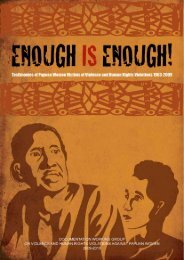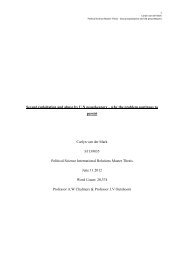The Impact of Armed Conflict on Women and Girls - UNFPA
The Impact of Armed Conflict on Women and Girls - UNFPA
The Impact of Armed Conflict on Women and Girls - UNFPA
Create successful ePaper yourself
Turn your PDF publications into a flip-book with our unique Google optimized e-Paper software.
average rate <str<strong>on</strong>g>of</str<strong>on</strong>g> 2.8 children per woman (1999) str<strong>on</strong>gly suggests that aborti<strong>on</strong>,<br />
which was legal up to 12 weeks <str<strong>on</strong>g>of</str<strong>on</strong>g> pregnancy <strong>and</strong> up to 22 weeks for medical<br />
reas<strong>on</strong>s, may be widely used for fertility c<strong>on</strong>trol. A recent <strong>UNFPA</strong>/IOM study<br />
c<strong>on</strong>firms that aborti<strong>on</strong> is a comm<strong>on</strong>, under-reported practice, possibly as high as<br />
50 aborti<strong>on</strong>s per 100 deliveries. Pr<str<strong>on</strong>g>of</str<strong>on</strong>g>essi<strong>on</strong>als believe that excessive aborti<strong>on</strong>s<br />
have c<strong>on</strong>tributed to Kosovo’s high infant <strong>and</strong> maternal mortality.” 65 <strong>UNFPA</strong><br />
figures indicate that the perinatal mortality rate for hospital-born babies in the<br />
year 2000 was 29.2 per 1,000 babies. <str<strong>on</strong>g>The</str<strong>on</strong>g> total infant mortality rate was<br />
estimated to be 45/1000 in 1999, which was an improvement from the late<br />
1980s. 66 <str<strong>on</strong>g>The</str<strong>on</strong>g> paper “Health Policy for Kosovo” notes that “infants accounted for<br />
40 per cent <str<strong>on</strong>g>of</str<strong>on</strong>g> in-hospital mortality, the mortality <str<strong>on</strong>g>of</str<strong>on</strong>g> sick ne<strong>on</strong>ates being<br />
alarmingly high”. 67 It is comm<strong>on</strong> knowledge that women do not breastfeed their<br />
children, but there exists no reliable informati<strong>on</strong>. If true, it may partly explain the<br />
poor health <str<strong>on</strong>g>of</str<strong>on</strong>g> newborn babies. It is certainly a worthy area for further research.<br />
<str<strong>on</strong>g>The</str<strong>on</strong>g>re is also no informati<strong>on</strong> available about the c<strong>on</strong>sequences <str<strong>on</strong>g>of</str<strong>on</strong>g> losses <str<strong>on</strong>g>of</str<strong>on</strong>g><br />
children for the health <str<strong>on</strong>g>of</str<strong>on</strong>g> mothers.<br />
<str<strong>on</strong>g>The</str<strong>on</strong>g> expected lifetime <str<strong>on</strong>g>of</str<strong>on</strong>g> women in Kosovo is unknown. Doctors say that<br />
women’s health in general is too poor. Many women suffer from anemia due to<br />
bad food <strong>and</strong> short interval between births, smoking is terribly comm<strong>on</strong> am<strong>on</strong>g<br />
women <strong>and</strong> men, which has str<strong>on</strong>g chr<strong>on</strong>ic disease implicati<strong>on</strong>s for the future.<br />
Many women suffer from losses <str<strong>on</strong>g>of</str<strong>on</strong>g> family members <strong>and</strong> trauma from the Kosovo<br />
c<strong>on</strong>flict. Several women, especially in the areas where the fighting was most<br />
severe <strong>and</strong> where most people “disappeared” c<strong>on</strong>tinue to be traumatized, are still<br />
unable to face a new future. 68<br />
Different sexual orientati<strong>on</strong>s are <strong>on</strong>e <str<strong>on</strong>g>of</str<strong>on</strong>g> the many cultural taboos in<br />
Kosovar society. Am<strong>on</strong>g women <strong>and</strong> men, “most [gay people] have decided to<br />
ignore, hide, or deny their sexuality.” 69<br />
<str<strong>on</strong>g>The</str<strong>on</strong>g> author has no informati<strong>on</strong> about sex educati<strong>on</strong> or sexual diseases,<br />
except that six cases <str<strong>on</strong>g>of</str<strong>on</strong>g> HIV were reported to the Department <str<strong>on</strong>g>of</str<strong>on</strong>g> Health in 2000.<br />
Trafficking in <strong>Women</strong><br />
One <str<strong>on</strong>g>of</str<strong>on</strong>g> the first issues to be <str<strong>on</strong>g>of</str<strong>on</strong>g>ficially addressed by internati<strong>on</strong>al agencies<br />
<strong>and</strong> NGOs working <strong>on</strong> gender in Kosovo was trafficking in women. After <strong>on</strong>ly<br />
three m<strong>on</strong>ths <str<strong>on</strong>g>of</str<strong>on</strong>g> an internati<strong>on</strong>al presence, it became clear that this was a<br />
growing problem. A Gender Task Force Meeting was organized by UNIFEM, <strong>and</strong><br />
resulted in a subgroup that developed the UNMIK Regulati<strong>on</strong> <strong>on</strong> trafficking in<br />
pers<strong>on</strong>s. This was later approved by the United Nati<strong>on</strong>s after a l<strong>on</strong>g process.<br />
65 Kosovo Comm<strong>on</strong> Assessment, p. 21.<br />
66 <strong>UNFPA</strong> Informati<strong>on</strong> sheet.<br />
67 Ibid.<br />
68 UNIFEM workshops 2000-2001.<br />
69 No Safe Place, p. 109.<br />
87




![IANSA [PDF, 2MB] - PeaceWomen](https://img.yumpu.com/25206379/1/190x123/iansa-pdf-2mb-peacewomen.jpg?quality=85)
![Commitments Sample [PDF, 93KB] - PeaceWomen](https://img.yumpu.com/25206331/1/190x245/commitments-sample-pdf-93kb-peacewomen.jpg?quality=85)










![A Toolkit for Advocacy and Action [PDF, 260KB] - Peace Women](https://img.yumpu.com/25205989/1/190x245/a-toolkit-for-advocacy-and-action-pdf-260kb-peace-women.jpg?quality=85)